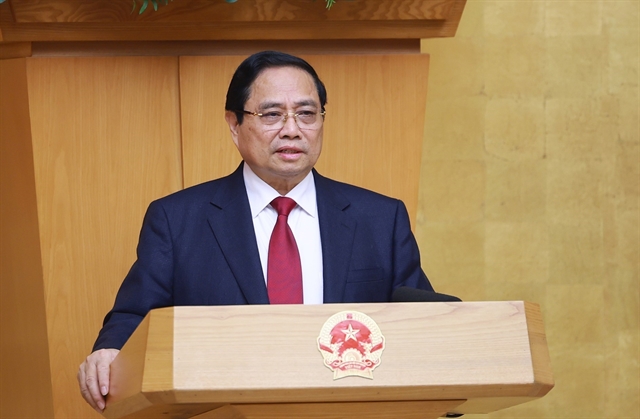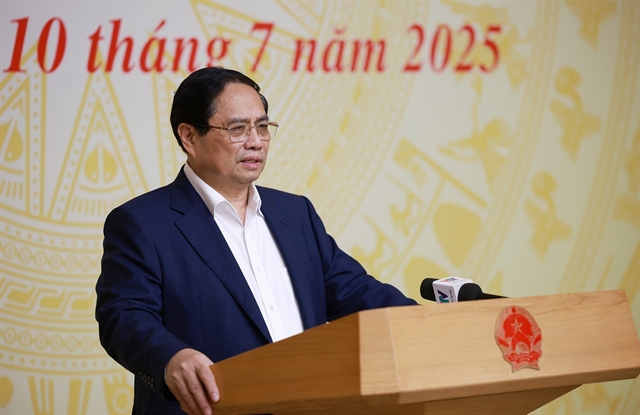 Politics & Law
Politics & Law

 |
| Prime Minister Phạm Minh Chính delivers a speech at the conference reviewing three years of implementing Resolution 18-NQ/TW and one year of enforcing the 2024 Land Law. VNA/VNS Photo |
HÀ NỘI — Prime Minister Phạm Minh Chính has called for a comprehensive review and revision of land-related laws and policies to better reflect practical needs, enhance State governance and support the country’s sustainable development goals.
He issued the directive on Thursday while chairing a conference reviewing three years of implementing Resolution 18-NQ/TW and one year of enforcing the 2024 Land Law. The conference also discussed proposed amendments to Resolution 18 as a basis for revising the Land Law.
In his opening remarks, PM Chính stressed that land policies and legislation have far-reaching impacts on all citizens and sectors. After three years of implementing Resolution 18, which focused on reforming land management mechanisms to boost efficiency and support Việt Nam’s ambition of becoming a high-income country, and one year of enforcing the new Land Law, land governance has seen coordinated improvements and produced positive outcomes.
According to the Prime Minister, land policies have increasingly taken root in practice, helping to resolve long-standing challenges, enhance State management and contribute to socio-economic development, national defence and security, and long-term sustainability. These efforts have also helped build public and investor confidence.
However, he noted that shortcomings remain. Some policies are still not aligned with the ongoing restructuring of the two-tier local administrative model and fall short of meeting the demands of the new development phase.
One major issue, he said, is the persistent distinction in land recovery policies between projects funded by public versus private investment. Lengthy and complex procedures for land recovery, compensation, support, resettlement, allocation, leasing and land-use conversion also continue to hinder implementation.
Additionally, several land finance policies outlined in Resolution 18 have yet to be fully institutionalised. The State’s role as landowner and regulator of land prices is still not clearly defined, enabling land auctions to be manipulated in many areas for speculation and market distortion.
Explaining these limitations, the PM pointed to a lack of unified understanding about the importance of land in the socialist-oriented market economy and about the State’s role in land ownership and management. He also highlighted overlapping, inconsistent and frequently amended land-related regulations that complicate enforcement.
Furthermore, he noted that some localities have failed to adequately invest in land-use planning, resource allocation and removing bottlenecks that prevent land from being effectively leveraged for economic and social development.
At the conference, PM Chính instructed relevant bodies to propose updates and new solutions to further improve land governance. These include reforms in land-use planning at the national, provincial and commune levels; mechanisms to resolve overlaps between different land-use plans; and prioritising land allocation for transport, industrial, service and urban infrastructure development.
He also called for maintaining sufficient land for rice cultivation to ensure national food security, while allowing low-productivity rice land to be converted for other crops, livestock or purposes that enhance land efficiency.
The Prime Minister also proposed reforms to land allocation, leasing and land-use conversion. These include adopting flexible approaches based on project type, scale and location; ensuring equal access to land for both public and private investors; allowing land users to choose between annual or one-time rental payments; and encouraging annual payments to secure a stable source of State revenue.
He directed agencies to propose flexible mechanisms for reallocating surplus land from the consolidation of State offices or divested State-owned enterprises to serve socio-economic development goals.
As for land recovery and resettlement, PM Chính emphasised that these must only proceed once approved compensation and resettlement plans are in place, unless land users voluntarily agree to hand over their land.
In cases where land recovery requires resettlement, resettlement must be completed before land is reclaimed, except for urgent or emergency projects approved by relevant authorities; on-site resettlement within the project area; or cases where resettlement is arranged along the route of the main infrastructure project.
He also emphasised the need for temporary housing policies for affected households during the interim period. The Government will continue to promote the policy of separating compensation, support and resettlement projects from investment projects to allow for earlier implementation, and will expand the categories of land recovery permitted for socio-economic development in the national and public interest.
The Prime Minister also called for a market-based but State-controlled approach to land pricing, including setting specific rates for different project types and determining deductions for infrastructure costs. He urged studies on land-related issues involving foreign entities.
PM Chính assigned the Ministry of Agriculture and Environment to work with the Government Office to promptly incorporate feedback and findings and finalise draft reports to submit to the appropriate authorities in a timely manner. — VNS